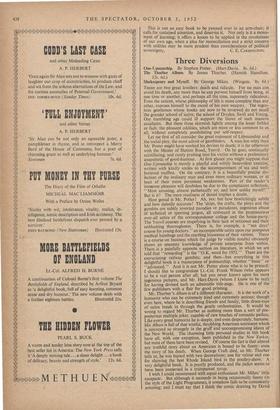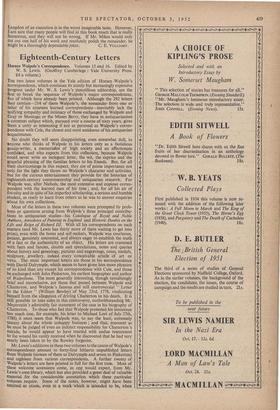Three Diversions
One-Upmanship. By Stephen Potter. (Hart-Davis. 8s. 6d.) Shakespeare and Myself. By George Mikes. (Wingate. 8s. 6d.)
THERE are two great levellers: death and ridicule. For no man can avoid his death, any more than he can prevent himself from being, at one time or another, and perhaps all the time, supremely ridiculous. Even the satirist, whose philosophy of life is more complete than any other, exposes himself to the recoil of his own weapon. The ingen- ious gentlemen whose books are now to be reviewed do not recall the grander school of satire; the school of Dryden, Swift and Young. Our trembling age could ill support the blows of such massive assailants. But these three skirmish lightly among the lesser foibles or fads, the pleasant oddities, which are more or less common to us all, without completely annihilating our self-respect.
Let me first of all consider the great exponent of Lifemanship and the social ploy, the most adroit of gambiteers. A man less witty than Mr. Potter might have worked his devices to death; it is far otherwise with the Master of Station Road, Yeovil. On he goes, continually scintillating, and rarely probing into his victim without a preliminary anaesthetic of good-humour. At first glance you might suppose that One-Upmanship is merely a playful and wittily benevolent exercise, written with kindly smiles to the accompaniment of tea and well- buttered muffins. On the contrary, it is a beautifully precise dis- S'ection of the ordinary man and even more ordinary woman, or at least of their more persistent weaknesses. Part of the reader's immense pleasure will doubtless be due to the complacent reflection, "Most amusing, almost pathetically so; and how unlike myself!" But is it? The mere readiness of denial implies a doubt.
How genial is Mr. Potter! Ah, yes: but how bewitchingly subtle and how daintily accurate! The 'ships, the crafts, the ploys and the gambits are subtly inverted parodies or paradoxes, ingenious abuse of technical or sporting jargon, all conveyed in the preposterous over-all satire of the correspondence college and the house-party. The Yeovil courses are stupefying in their lack of reticence and their unblushing thoroughness. There is, for example, a "ten days' course for young doctors," an incomparable satire upon our pompous medical humbugs and the startling innocence of their victims. There is a course on business which (to judge by visible results) obviously shows an uncanny knowledge of private enterprise from within. There is a painfully apposite section on literature, in which we are told that "rewarding" is the "O.K. word for 1952." There are the excruciating railway gambits; and then—but everything in this delightful book is a masterpiece of jestmanship, whether "basic" or "advanced." And it is not Mr. Potter alone who is to be praised: I should like to congratulate Lt.-Col. Frank Wilson (who appears to be a real person after all; but you never know) upon his most ingenious pictures, and Mr. Hart-Davis (whom I know to be real) for having devised such an admirable title-page. He is one of the few publishers with a flair for good printing.
Mr. Thurber's Album is of a different character. It is the work of a humorist who can be extremely kind and extremely serious; though even here, where he is describing friends and family, little drum-taps of satire break in through the gentle orchestration. It would be wrong to regard Mr. Thurber as nothing more than a sort of pre- posterous multiple joker, capable of rare touches of romantic pathos. Like every great humorist he is deeply, and even desperately, humane. His Album is full of that wistful, throbbing American sentiment which is conveyed so strangely in the gruff and uncompromising idiom of the New World. The charming little personal studies in this book have all, with one exception, been published in the New Yorker, but most of them have been revised. Of course the fact is that almost any truthful story about an American is bound to be funny: even the story of his death. When George Craft died, so Mr. Thurber tells us, he was buried with two decorations; one for valour and one for showing the best Rhode Island bird in the poultry-show. A very delightful book. It is poorly produced, and the jacket seems to have been immersed in a transparent syrup.
1 wish I could recommend with equal enthusiasm Mr. Mikes' little escapade. But although it succeeds in being occasionally funny (in the style of the Light Programme), it somehow fails to be consistently amusing; and I must say that I think the comic drawing by David
Langdon of an execution is in the worst imaginable taste. However, I am sure that many people will find in this book much that is really humorous, and they will not be wrong. If Mr. Mikes would only cut out one half of his work and resolutely polish the remainder, he
might be a thoroughly dependable joker. C. E. VULLIAMY.



















































 Previous page
Previous page